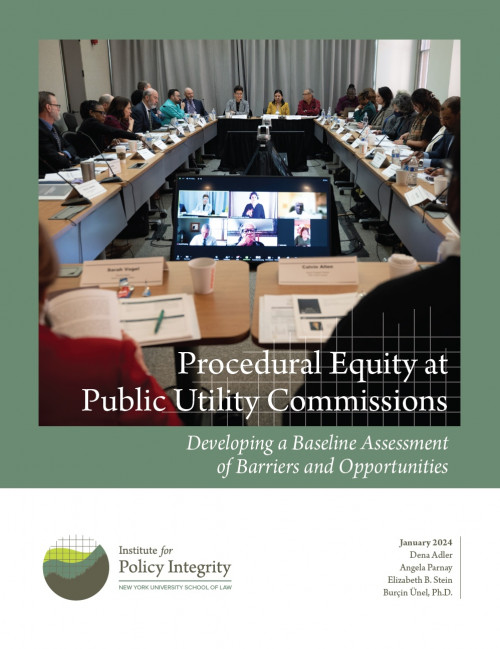-
Distributional Impacts of Carbon Capture in the US Power Sector
Published in the Journal of the Association of Environmental and Resource Economists
While some see carbon capture, utilization, and storage (CCUS) as crucial for cost-effective decarbonization, it faces opposition based on air pollution and equity concerns. To understand this cost–air pollution trade-off, we simulate the potential impacts of allowing CCUS deployment in the U.S. power sector under plausible climate policies. We show that the existence of this trade-off critically depends on the underlying policy, which affects the type of generation CCUS could displace, and that allowing CCUS can yield energy-cost savings, particularly benefiting lower-income communities.
-
Comments to EPA’s SAB on Peer Review of Draft Revised EJTG
EPA's Science Advisory Board (
SAB) seeks comments on its review report of the EPA’s Draft Revised Environmental Justice Technical Guidance (EJTG), which reviews the methods and procedures described in EPA’s Draft Revised EJTG for evaluating environmental justice concerns in regulatory actions. Policy Integrity submitted comments making four key recommendations that the SAB can use to advise EPA. -
Just Regulation: Improving Distributional Analysis in Agency Rulemaking
Published in Ecology Law Quarterly
This Article seeks to understand the shortcomings of current agency practice and outline what agencies can do better. To do so, it examines fifteen significant proposed or final agency rules promulgated during the Biden-Harris Administration’s first eighteen months and reveals four categories of limitations. First, agencies often pursue inconsistent goals across different regulatory initiatives. Second, they do not grapple with the core issue that distributional analysis should raise: the extent to which the better distributional consequences of one alternative should trump the higher net benefits of another alternative. Third, agencies do not apply a consistent approach to defining disadvantaged groups, which makes the analysis inconsistent and unpredictable. Fourth, the distributional analysis relies on a truncated set of costs and benefits, and thus presents an incomplete picture of the consequences of regulation on disadvantaged communities.
-
Comments to DOE on Draft Goals for Environmental Justice Strategic Plan
In June, the Department of Energy (DOE) released draft goals for its Environmental Justice Strategic Plan and requested feedback through public comments. Executive Order 14,096 directs each federal agency to create an environmental justice strategic plan that “sets forth the agency’s vision, goals, priority actions, and metrics to address and advance environmental justice.” Our comments suggested that DOE should include objectives under their proposed goals to develop and issue agency-wide guidance on how to consider and analyze environmental justice concerns in their regulatory and policy actions.
-
Comments to EPA Science Advisory Board on Draft Peer Review Report on Draft Revised Environmental Justice Technical Guidance
EPA's Science Advisory Board (SAB) sought comments on its draft peer review report on EPA’s Draft Revised Environmental Justice Technical Guidance (EJTG). This report reviews the methods and procedures described in EPA’s Draft Revised EJTG for evaluating environmental justice concerns in regulatory actions. The Institute for Policy Integrity submitted comments making three key recommendations that the SAB can use to advise EPA.
-
Policy Integrity Scholarship and Advocacy Reflected in CEQ’s Rule for Conducting Environmental Review
On April 30, CEQ revised its implementing regulations for the National Environmental Policy Act that undergird how federal agencies conduct environmental review of proposed projects. Consistent with federal caselaw, CEQ’s regulations emphasize the need to consider climate change and environmental justice impacts in environmental review, among other key revisions. These revisions are also consistent with suggestions that Policy Integrity has offered through our scholarship, reports, and comments on ensuring careful consideration of climate change and environmental justice in federal permitting. In addition, CEQ implemented several of Policy Integrity’s suggestions to enhance its cost-benefit analysis for this rulemaking.
-
Comments to New York DEC and NYSERDA on Draft Climate Act Disadvantaged Communities Investment and Benefits Reporting Guidance
In December 2023, the New York State Department of Environmental Conservation and New York State Energy Research and Development Authority released the Draft Climate Act Disadvantaged Communities Investment and Benefits Reporting Guidance for public comment. The draft guidance proposed a methodology to be used by New York State agencies, authorities, and entities to account for and report the benefits of their clean energy and energy efficiency spending accrued in disadvantaged communities and across the state overall. This information will then be used to calculate the State’s compliance with the Climate Leadership and Community Protection Act’s requirement that a minimum of 35 percent, with a goal of 40 percent, of the benefits of clean energy and energy efficiency spending accrue to disadvantaged communities. In comments, we gave suggestions on how to improve the guidance.
-
Comments to EPA on Draft Revision of Technical Guidance for Assessing Environmental Justice in Regulatory Analysis
EPA seeks comments on the it's Draft Revised EJ Technical Guidance, which highlights technical approaches that analysts can use to evaluate environmental justice concerns in regulatory actions. The Institute for Policy Integrity's comments to the agency advocate for enhanced documentation and transparency in environmental justice assessments.
-
Comments to CEQ on Phase One of the Environmental Justice Scorecard
The Council on Environmental Quality (CEQ) recently published Phase One of the Environmental Justice Scorecard (Scorecard), which evaluates federal agencies' progress on advancing the Justice40 Initiative, implementing and enforcing environmental and civil rights laws, and institutionalizing environmental justice. CEQ sought public feedback on the Scorecard’s usability and potential qualitative and quantitative metrics to improve future iterations of the Scorecard. The Institute for Policy Integrity submitted comments recommending several changes to enhance transparency, accountability, and comprehensiveness.
-

Procedural Equity at Public Utility Commissions
Developing a Baseline Assessment of Barriers and Opportunities
Combatting climate change will require major transitions in the energy sector. In the United States, state-level entities like public utility commissions play a key role in this transition. Commissions help decide where and when clean energy displaces fossil-fuel combustion, and how costs associated with energy system investments are passed on to consumers, so their actions can affect emissions outcomes as well as the health, energy, environmental, and affordability burdens faced by disadvantaged communities. Although many Commission processes incorporate some form of stakeholder input or participation, it is often difficult for the public to participate due to the technical and complex nature of these proceedings. These challenges present a procedural justice issue. In this report, we reviewed a range of practices for enhancing procedural justice at Commissions in nine states. This review was based on a structured survey of Commissions’ websites, resources available to prospective participants, and relevant statutes and regulations.
Viewing recent projects in Environmental, Energy & Climate Justice








